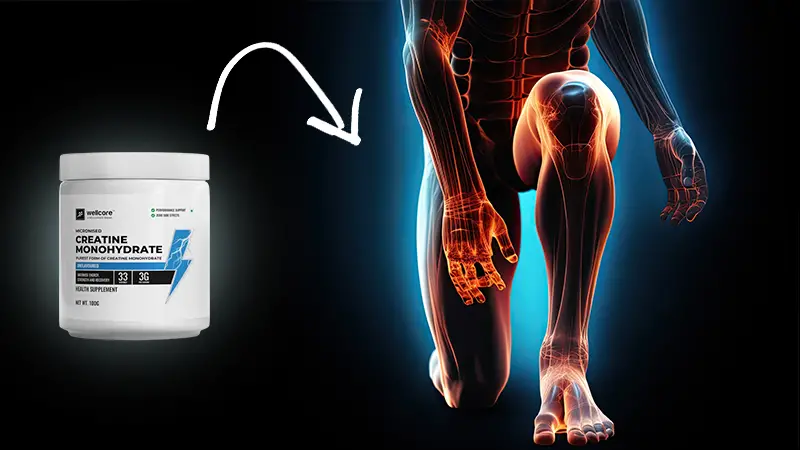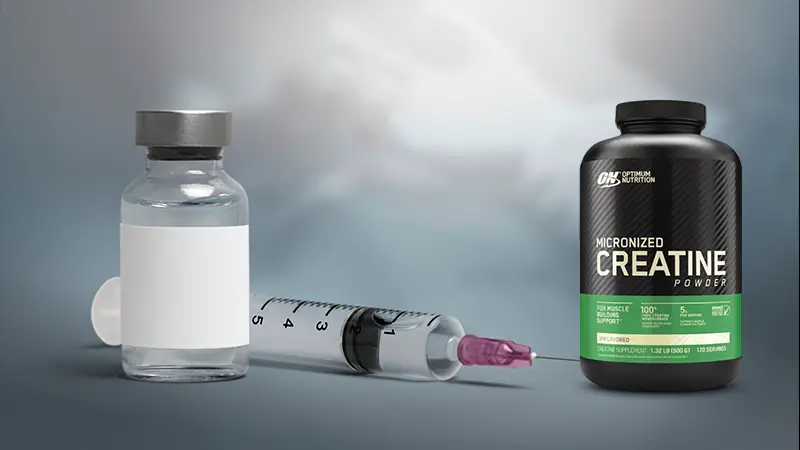Creatine is a popular dietary supplement embraced by athletes, bodybuilders, and fitness enthusiasts to enhance muscle performance and promote gains in muscle mass.
While it is generally recognized for its beneficial effects on strength and power, it is important to acknowledge the potential side effects associated with creatine supplementation.
This introduction provides an overview of creatine side effects that individuals may experience when using creatine.
Creatine’s side effects range from relatively mild and transient discomfort, such as digestive issues, to more concerning potential impacts on vital organs like the kidneys and liver.
Additionally, individuals may encounter allergic reactions or psychological effects. It is crucial to be well-informed about these side effects and take the necessary precautions when considering creatine supplementation.
This discussion will delve into seven common side effects of creatine, examining each in detail to provide a comprehensive understanding of the potential risks and how to mitigate them.
Creatine Side Effects

Creatine is a popular dietary supplement used by athletes and bodybuilders to enhance muscle performance and increase muscle mass.
While it is generally considered safe for most people when used at recommended doses, some individuals may experience side effects.
Here are the potential side effects of creatine supplementation:
Digestive Discomfort
Some individuals may experience digestive issues such as bloating, gas, and stomach cramps when taking creatine supplements.
This discomfort is usually mild and can often be alleviated by drinking plenty of water and splitting the dosage throughout the day.
Dehydration
Creatine supplementation may lead to increased water retention within muscles, potentially causing dehydration, especially if users do not drink enough water to compensate for this effect.
It is crucial to stay well-hydrated when taking creatine to prevent dehydration-related complications.
Muscle Cramps
Some users have reported experiencing muscle cramps while taking creatine supplements.
While the exact cause is not well understood, it is recommended to maintain proper hydration and electrolyte balance to minimize the risk of muscle cramps.
Kidney Damage
There have been concerns about the potential impact of creatine on kidney function. Prolonged use of high doses may strain the kidneys, especially in individuals with pre-existing kidney conditions.
It’s important for individuals with kidney issues to consult a healthcare professional before using creatine supplements.
Gastrointestinal Distress
Creatine supplementation might cause gastrointestinal distress in some individuals, leading to nausea and diarrhea. Adjusting the dosage or choosing a different form of creatine, such as creatine monohydrate, may help mitigate these symptoms.
Weight Gain
Creatine supplementation can lead to weight gain due to increased water retention within the muscles. While this can be desirable for athletes aiming to enhance muscle mass, individuals seeking weight loss might be concerned about this effect.
Allergic Reactions
Although rare, some individuals may be allergic to creatine supplements, experiencing symptoms such as rash, itching, or difficulty breathing. If any signs of an allergic reaction occur, it is essential to seek immediate medical attention.
Interference with Certain Medications
Creatine might interact with medications like nonsteroidal anti-inflammatory drugs (NSAIDs) or diuretics, potentially affecting their efficacy. It’s crucial to consult a healthcare provider before combining creatine with any medication to avoid adverse interactions.
Negative Mental Health Effects
Some users have reported mood swings, irritability, or increased anxiety while taking creatine supplements.
While scientific evidence on this matter is limited and individual responses vary, those with a history of mental health issues should exercise caution and consult a healthcare professional if they notice any negative changes in their mental well-being.
It’s important to note that these side effects are not experienced by everyone, and many users take creatine supplements without any adverse reactions.
Nonetheless, it is advisable to consult a healthcare professional before starting any new dietary supplement, especially if you have pre-existing health conditions or concerns about potential side effects.
How Does Creatine Work Biologically?

Creatine is a naturally occurring compound found in small amounts in certain foods and synthesized within the human body, primarily in the liver, kidneys, and pancreas.
It plays a crucial role in the energy metabolism of cells, particularly in muscle tissue. Here’s a breakdown of how creatine works biologically:
Energy Storage
Creatine is stored in muscles as creatine phosphate. When you perform short bursts of intense physical activity, such as weightlifting or sprinting, your muscles need a rapid source of energy.
Creatine phosphate is readily available and can quickly donate a phosphate group to adenosine diphosphate (ADP) to form adenosine triphosphate (ATP), which is the primary energy currency of cells.
ATP Regeneration
During high-intensity activities, ATP levels can be depleted within seconds. Creatine phosphate helps to regenerate ATP, allowing muscles to maintain their energy supply for short bursts of power and strength.
This process is essential for immediate and intense muscle contractions.
Enhanced Muscle Performance
By replenishing ATP stores, creatine supplementation increases the availability of energy during exercise.
This leads to improved muscle performance and endurance, allowing athletes and bodybuilders to lift heavier weights, perform more reps, and sustain high-intensity efforts for longer periods.
Increased Muscle Mass
Creatine supplementation can lead to a temporary increase in muscle size. This is due to the additional water retention within the muscle cells, providing a fuller and more voluminous appearance.
Over time, this may contribute to muscle growth when combined with proper training and nutrition.
Buffering Lactic Acid
Creatine may help buffer the buildup of lactic acid in muscles during intense exercise. Lactic acid accumulation is a major factor in muscle fatigue, and by assisting in its removal, creatine can extend the time before muscle fatigue sets in.
Neuroprotective Effects
Creatine is not limited to its benefits for muscles. Research suggests that it may have neuroprotective effects by supporting brain energy metabolism. This makes creatine a subject of interest in studies on neurodegenerative diseases and cognitive function.
Cell Hydration
Creatine’s effect on water retention in muscle cells, while leading to temporary weight gain, can also contribute to improved cell hydration and nutrient uptake. Hydrated cells function optimally and can recover more effectively from intense exercise.
Creatine works biologically by enhancing the rapid replenishment of ATP, providing energy for short bursts of intense physical activity.
This increased energy availability improves muscle performance, delays fatigue, and contributes to muscle growth when combined with appropriate training and nutrition.
Additionally, creatine may have broader benefits, including potential neuroprotective effects and improvements in cell hydration.
How Does Creatine Interact With Other Drugs?

Creatine is a widely used dietary supplement that is generally considered safe for most individuals when used at recommended doses. However, it can interact with certain medications or other substances, potentially affecting their effectiveness or leading to adverse reactions.
Here are the interactions to be aware of:
Diuretics (Water Pills)
Creatine may lead to increased water retention in the body, potentially counteracting the effects of diuretics. Diuretics are often prescribed to reduce fluid retention and lower blood pressure.
When taken together with creatine, diuretics may be less effective at managing fluid balance. If you are on diuretics, consult your healthcare provider before using creatine to ensure that your treatment plan is not compromised.
Nonsteroidal Anti-Inflammatory Drugs (NSAIDs)
NSAIDs are commonly used for pain relief and reducing inflammation. Creatine may interact with these drugs, potentially affecting their efficacy or causing unwanted side effects.
While the specific interactions are not well-documented, it’s advisable to consult your healthcare provider if you plan to use both creatine and NSAIDs simultaneously.
Caffeine
Some people choose to combine creatine with caffeine-containing products, such as coffee or energy drinks, to boost energy levels before workouts.
While there is no clear evidence of harmful interactions, excessive caffeine consumption can lead to dehydration, which may be exacerbated by creatine’s water-retaining effects. Staying well-hydrated is crucial when using both substances.
Prescription Medications
Creatine may interact with specific prescription medications, especially those that are processed by the liver or excreted by the kidneys. These interactions could impact the metabolism or elimination of certain drugs.
Always inform your healthcare provider about any dietary supplements you are taking to ensure they are aware of potential interactions with your prescription medications.
Anticoagulants (Blood Thinners)
Creatine does not directly interact with blood thinners, but the increased blood volume due to water retention may affect the consistency of your blood. If you are on blood thinners, it is important to maintain stable blood thickness.
Consult your healthcare provider before using creatine to determine if it is appropriate for you.
Lithium
Lithium is a medication often used to treat bipolar disorder. Creatine may increase the excretion of lithium by the kidneys, potentially lowering its effectiveness.
If you are taking lithium, it’s crucial to discuss creatine supplementation with your healthcare provider to monitor your lithium levels and adjust your treatment plan as necessary.
Alcohol
Alcohol can interfere with creatine’s absorption and utilization. Additionally, excessive alcohol consumption can lead to dehydration, which may exacerbate creatine’s water-retaining effects and strain the kidneys.
If you are taking creatine and plan to consume alcohol, it’s advisable to do so in moderation and ensure you maintain proper hydration.
Creatine can potentially interact with various medications and substances, but the specific effects and risks can vary. It’s essential to consult with your healthcare provider before using creatine if you are taking any prescription medications, especially those that affect the kidneys or liver.
Open communication with your healthcare provider will help ensure your safety and optimize the effectiveness of your treatment plan.
FAQs
Are there common digestive side effects associated with creatine supplementation?
Yes, some users may experience mild digestive discomfort, including bloating, gas, and stomach cramps when taking creatine. These symptoms can often be managed by drinking plenty of water and dividing the creatine dose throughout the day, reducing the likelihood of digestive issues.
Can creatine affect kidney function negatively?
Creatine may lead to a slight increase in serum creatinine levels, which is a marker of kidney function. However, this increase is usually modest and temporary, with no harmful effects on kidney health when used at recommended doses.
Individuals with pre-existing kidney conditions should consult a healthcare provider before starting creatine supplementation.
Does creatine cause liver damage?
There have been limited reports of creatine affecting liver enzyme levels in some individuals, but these elevations are generally mild and reversible upon discontinuation.
It’s advisable to consult a healthcare professional if you have liver issues or concerns about potential interactions with liver-processed medications.
Can creatine lead to muscle cramps?
Yes, some users have reported muscle cramps when taking creatine supplements. While the exact cause is not well understood, maintaining proper hydration and electrolyte balance can help reduce the risk of muscle cramps.
Are there psychological side effects associated with creatine use?
Some individuals have reported mood swings, irritability, or increased anxiety when using creatine, though scientific evidence on this topic is limited.
Individual responses may vary, but those with a history of mental health issues should exercise caution and consult a healthcare professional if they notice any adverse psychological changes.
Conclusion
Creatine, a well-regarded dietary supplement, offers a range of performance and muscle-building benefits to its users. However, the potential for side effects should not be overlooked.
This discussion has shed light on nine notable side effects, encompassing digestive discomfort, dehydration, muscle cramps, potential kidney and liver impacts, gastrointestinal distress, weight gain, allergic reactions, and psychological effects.
While it is essential to be aware of these potential side effects, it is equally important to stress that the majority of individuals who use creatine do not experience any adverse reactions, particularly when they adhere to recommended dosages and stay well-hydrated.
Regular consultation with healthcare professionals and monitoring of kidney and liver function can further mitigate potential risks.
When used responsibly and informed, creatine can be a valuable tool in enhancing physical performance and muscle development for many individuals.
Hi, I’m Mark Pattinson and I’m a freelance personal trainer. I’ve been working in the fitness industry for over 10 years especially since I work with diabetes patients and I love helping people achieve their fitness goals. I believe that everyone can benefit from a good workout, and I’ll do everything to make sure you get the most out of your training.